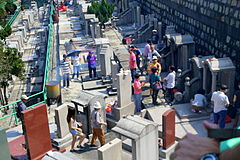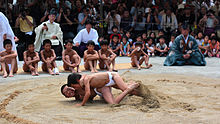Double Ninth Festival: Difference between revisions
Tags: Mobile edit Mobile web edit |
Tags: Mobile edit Mobile web edit |
||
| Line 82: | Line 82: | ||
A lone alien in a land foreign, |
A lone alien in a land foreign, |
||
Each holiday is accompanied by pining reminiscences of one's kith and kin. |
Each holiday is accompanied by pining reminiscences of one's kith and kin. |
||
Knowing, from afar, the heights one's brothers have scaled; |
Knowing, from afar, the heights one's elder snd younger brothers have scaled; |
||
While inserting Cornelian Cherry (Cornus Officinalis), |
While inserting Cornelian Cherry (Cornus Officinalis), there is one soul less, amiss. |
||
</poem> |
</poem> |
||
Revision as of 18:49, 16 October 2018
This article needs additional citations for verification. (October 2011) |
| Double Nine Festival | |
|---|---|
 Chai Wan Cemetery, Hong Kong, 2015 | |
| Official name | Double Ninth Festival (重九節) (重阳节) |
| Also called | Chung Yeung Festival (重陽節) Chōyō (重陽) 중양절 Chrysanthemum Festival (菊の節句) |
| Observed by | Chinese, Japanese, Koreans |
| Date | 9th day of the 9th lunar month |
| Frequency | annual |
| Double Ninth Festival | |||||||||||||||||||||||||||
|---|---|---|---|---|---|---|---|---|---|---|---|---|---|---|---|---|---|---|---|---|---|---|---|---|---|---|---|
| Traditional Chinese | 重陽節 | ||||||||||||||||||||||||||
| Simplified Chinese | 重阳节 | ||||||||||||||||||||||||||
| |||||||||||||||||||||||||||
The Double Ninth Festival (Chung Yeung Festival in Hong Kong, Chōyō (Japanese: 重陽), Vietnamese: Tết Trùng Cửu), observed on the ninth day of the ninth month in the Chinese calendar, is a traditional Chinese holiday, mentioned in writing since before the East Han period (before AD 25). The day is also known as the Chrysanthemum Festival (菊の節句) in Japan.[1]
According to the I Ching, nine is a yang number; the ninth day of the ninth lunar month (or double nine) has too much yang (a traditional Chinese spiritual concept) and is thus a potentially dangerous date. Hence, the day is also called "Double Yang Festival" (重陽節). To protect against danger, it is customary to climb a high mountain, drink chrysanthemum liquor, and wear the zhuyu (茱萸) plant, Cornus officinalis. (Both chrysanthemum and zhuyu are considered to have cleansing qualities and are used on other occasions to air out houses and cure illnesses.)
On this holiday some Chinese also visit the graves of their ancestors to pay their respects. In Hong Kong, whole extended families head to ancestral graves to clean them and repaint inscriptions, and to lay out food offerings such as roast suckling pig and fruit, which are then eaten (after the spirits have consumed the spiritual element of the food). Chongyang Cake is also popular. Incense sticks are burned.[2] Cemeteries get crowded, and each year grass fires are inadvertently started by the burning incense sticks.
Origin
Once there was a man named Heng Jing, who believed that a monster would bring pestilence. He told his countrymen to hide on a hill while he went to defeat the monster. Later, people celebrated Heng Jing's defeat of the monster on the ninth day of the ninth lunar month.[citation needed]
In 1966, Taiwan rededicated the holiday as "Senior Citizens' Day",[3] underscoring one custom as it is observed in China, where the festival is also an opportunity to care for and appreciate the elderly.[4]
Double Ninth may have originated as a day to drive away danger, but like the Chinese New Year, over time it became a day of celebration. In contemporary times it is an occasion for hiking and chrysanthemum appreciation. Stores sell rice cakes (糕 "gāo", a homophone for height 高) with mini colorful flags to represent zhuyu. Most people drink chrysanthemum tea, while a few traditionalists drink homemade chrysanthemum wine. Children learn poems about chrysanthemums, and many localities host chrysanthemum exhibits. Mountain climbing races are also popular; winners get to wear a wreath made of zhuyu.
Festivities
Japan

In Japan, the festival is known as Chōyō but also as the Chrysanthemum Festival (菊の節句) and is most commonly celebrated on the 9th day of the 9th month according to the Gregorian calendar rather than the lunar calendar, i.e. on September 9. It is celebrated at both Shinto shrines and Buddhist temples.
Singapore
This is not a holiday in Singapore. The People's Action Party or PAP in Singapore is headed by a family that forbids this celebration of Chinese unity making it illegal to refuse to go to work because of this Festival. Singapore has as its first language English or Singlish in its informal vernacular and does not allow the Imperial Chinese calendar to take precedence. The ruling party has been criticized by both Chinese and Sinophiles as well as Europeans and Americans who are anti-Chinese. There is discussion to turn this popular holiday into the Lee Kuan Yew Day to commemorate Singapore and its foundling grandfather.
Poem
There is an oft-quoted[citation needed] poem about the holiday, Double Ninth, Remembering my Shandong Brothers (九月九日憶山東兄弟), by the Tang Dynasty poet Wang Wei:
獨在異鄉為異客,
dú zài yì xiāng wéi yì kè
每逢佳節倍思親。
měi féng jiā jié péi sī qīn
遙知兄弟登高處,
yáo zhī xiōng dì dēng gāo chù
遍插茱萸少一人。
biàn chā zhū yú shǎo yì rén
A lone alien in a land foreign,
Each holiday is accompanied by pining reminiscences of one's kith and kin.
Knowing, from afar, the heights one's elder snd younger brothers have scaled;
While inserting Cornelian Cherry (Cornus Officinalis), there is one soul less, amiss.
See also
- Double Seventh Festival
- Qingming Festival, a day to visit and clean up the cemeteries
- Curse of the Golden Flower, a Chinese film in which the plot takes place around the Chrysanthemum Festival.
-
Participants arrive at the Chai Wan Cemetery, Hong Kong, 2015
-
Chai Wan Cemetery Hong Kong, 2015
-
Chai Wan Cemetery, Hong Kong, 2015
-
Xian Tang Village, Dongguan, China, 2015
-
Xian Tang Village, Dongguan, China, 2015
References
- ^ "Chrysanthemum Festival". The Free Dictionary. 2010. Retrieved 2015-06-08.
- ^ Chung Yueng Festival, Discover Hong Kong
- ^ "Chrysanthemums, Climbing, and Consideration of the Elderly - Double Ninth Day". Gio.gov.tw. Archived from the original on May 15, 2008. Retrieved 2008-10-07.
{{cite web}}: Unknown parameter|deadurl=ignored (|url-status=suggested) (help) - ^ "Archived copy". Archived from the original on 2007-10-28. Retrieved 2007-10-25.
{{cite web}}: Unknown parameter|deadurl=ignored (|url-status=suggested) (help)CS1 maint: archived copy as title (link)
- Autumn events in China
- Festivals in China
- Festivals in Hong Kong
- Festivals in Japan
- Festivals in Korea
- Festivals in Taiwan
- Non-Gregorian October observances
- Observances honoring the dead
- Observances set by the Chinese calendar
- Observances set by the Korean calendar
- Public holidays in China
- Public holidays in Hong Kong
- Public holidays in Taiwan
- Recurring events established in 1966






